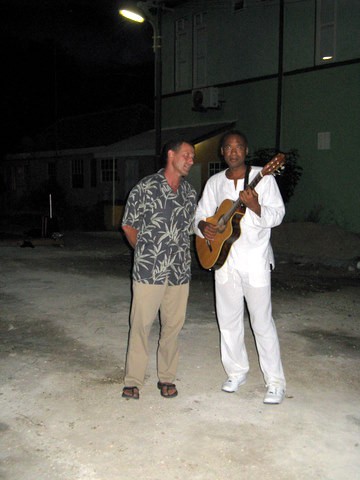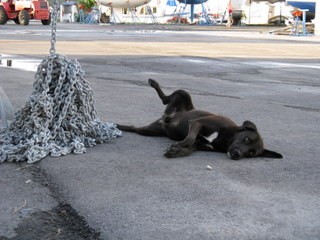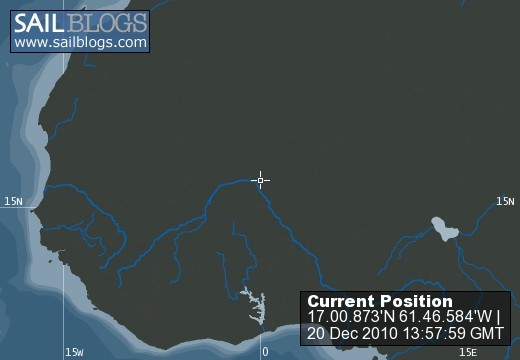
SCAPPATELLA
n. scah-pah-TELL'-ah 1. Italian word for "escapade"; an adventurous, unconventional act or undertaking 2. a journey with a little bit of intrigue; the secret escapade of two lovers 3. an affair, or in Rome, "a quickie in the bushes"
17 April 2010 | Green Island, Antigua to Fajardo, Puerto Rico
10 March 2010 | Bequia
08 March 2010 | Martinique
20 February 2010 | St. Vincent & The Grenadines
30 January 2010 | Bequia (St. Vincent & The Grenadines)
28 January 2010 | St. Lucia
25 January 2010 | St. Lucia
15 January 2010 | Green Island, Antigua
12 January 2010 | Green Island, Antigua
05 January 2010 | Back in Falmouth Harbor, Antigua
04 January 2010 | just south of Jolly Harbor, Antigua
01 January 2010 | Great Bird Island, Antigua
30 December 2009 | Parham, Antigua
29 December 2009 | Rabbit & Redhead Islands, Antigua
26 December 2009 | North Sound, Antigua
22 December 2009 | Antigua
19 December 2009 | St. Croix, USVI
14 December 2009 | Christensaid, St. Croix
10 December 2009 | Christiansted, St. Croix
09 December 2009 | Somewhere in the Caribbean Sea
Spearfishing, Russian Roulette Style
23 March 2009
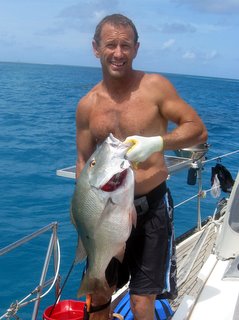
There are few places left in the Caribbean where it is still legal to spearfish; the Aves is one of them. Louis has been spearfishing since our sailing days in Mexico, but hasn't had much practice of late. He does have all the "right stuff", though: the hunting prowess, which he developed as a kid with his father and brothers in the rice fields of the Sacramento valley; a beautiful speargun his sweetie bought him one year for his birthday; and most importantly, an incredible set of lungs!
Spearfishing is typically done while free-diving, so you really need to develop some lung capacity to successfully hunt your prey while hanging out underwater. Louis is a natural. The other day I was down around 15 or 20 feet and up comes this apparition from way down deep on the reef. It's Louis, calmly kicking his way to the surface from the depths of 50 or so feet! And, recently, he made it down to 70 feet - a new record for him! I call him "Acqualung".
Anyway, this morning Louis decides to head out in search of dinner. The sea-life around here isn't exactly prolific, as much of the coral has been ravaged by storms, man, and global warming, I imagine. He's optimistic, but not overly. About 30 or 45 minutes later I hear him calling, "Sweetie", in an excited voice. I run up top as he's struggling to lift this whoppin' 20lb snapper-looking fish over the side! I excitedly get the camera and the fish book, and we identify him as a "mullet snapper". Here comes the Russian Roulette part...
As it says in "The Cruiser's Handbook of Fishing": "The majority of tropical cruising grounds are rife with opportunity to poison oneself from eating fish". Great. The toxin we're worried about, Ciguatera, is well-known in the Caribbean and typically found in reef-dwelling "piscivorous fish" (that would be your fish-eating fish variety). Like Snappers. Bummer. Unfortunately, there is no easy way to tell if a fish is "ciguatoxic". The toxicity of fish varies from one region to another, so the best method is to talk with local fishermen to see what they're eating, and what they're not. But we're all alone here. We've seen Snapper on the menu in Bonaire, but is it "mullet snapper"? The fish book suggests, "one strategy, in the unlikely event you have an expendable mammal on board, is to feed it some fish first..." Fortunately, we left all the obnoxious barking dogs behind in Curacao so we're all out of expendable mammals. (Ok, so we won't win any Greenpeace awards with that comment!) Another strategy, the one we're considering, is to eat just a little bit of the fish and see if it makes us sick...
But we're not just talking about an upset stomach here. A mild case of ciguatera includes "abdominal pain, nausea, vomiting, diarrhea, numbness, and tingling of the mouth and limbs within three to five hours following ingestion". Severe cases include all of those symptoms PLUS what's behind door number two: profound exhaustion (we just got over that!), muscle pain, feelings of loose and painful teeth, visual disturbances, slow reflexes, skin disorders, loss of hair and nails, reversal of hot and cold sensations, muscular paralysis, coma, and in some cases, death. Assuming you don't die from ciguatera, recovery can take months, with some symptoms continuing for years. WOAH.........
So, needless to say, the fish is currently sitting in the freezer...on hold until we get some local knowledge, or come across an expendable mammal. Wait...sshhhh.....is that barking I hear in the distance?
Spearfishing is typically done while free-diving, so you really need to develop some lung capacity to successfully hunt your prey while hanging out underwater. Louis is a natural. The other day I was down around 15 or 20 feet and up comes this apparition from way down deep on the reef. It's Louis, calmly kicking his way to the surface from the depths of 50 or so feet! And, recently, he made it down to 70 feet - a new record for him! I call him "Acqualung".
Anyway, this morning Louis decides to head out in search of dinner. The sea-life around here isn't exactly prolific, as much of the coral has been ravaged by storms, man, and global warming, I imagine. He's optimistic, but not overly. About 30 or 45 minutes later I hear him calling, "Sweetie", in an excited voice. I run up top as he's struggling to lift this whoppin' 20lb snapper-looking fish over the side! I excitedly get the camera and the fish book, and we identify him as a "mullet snapper". Here comes the Russian Roulette part...
As it says in "The Cruiser's Handbook of Fishing": "The majority of tropical cruising grounds are rife with opportunity to poison oneself from eating fish". Great. The toxin we're worried about, Ciguatera, is well-known in the Caribbean and typically found in reef-dwelling "piscivorous fish" (that would be your fish-eating fish variety). Like Snappers. Bummer. Unfortunately, there is no easy way to tell if a fish is "ciguatoxic". The toxicity of fish varies from one region to another, so the best method is to talk with local fishermen to see what they're eating, and what they're not. But we're all alone here. We've seen Snapper on the menu in Bonaire, but is it "mullet snapper"? The fish book suggests, "one strategy, in the unlikely event you have an expendable mammal on board, is to feed it some fish first..." Fortunately, we left all the obnoxious barking dogs behind in Curacao so we're all out of expendable mammals. (Ok, so we won't win any Greenpeace awards with that comment!) Another strategy, the one we're considering, is to eat just a little bit of the fish and see if it makes us sick...
But we're not just talking about an upset stomach here. A mild case of ciguatera includes "abdominal pain, nausea, vomiting, diarrhea, numbness, and tingling of the mouth and limbs within three to five hours following ingestion". Severe cases include all of those symptoms PLUS what's behind door number two: profound exhaustion (we just got over that!), muscle pain, feelings of loose and painful teeth, visual disturbances, slow reflexes, skin disorders, loss of hair and nails, reversal of hot and cold sensations, muscular paralysis, coma, and in some cases, death. Assuming you don't die from ciguatera, recovery can take months, with some symptoms continuing for years. WOAH.........
So, needless to say, the fish is currently sitting in the freezer...on hold until we get some local knowledge, or come across an expendable mammal. Wait...sshhhh.....is that barking I hear in the distance?
Comments
| Vessel Name: | Scappatella |
| Vessel Make/Model: | Lafitte 44 |
| Hailing Port: | Coloma, CA |
| Crew: | Janet Maineri |
PROFILE
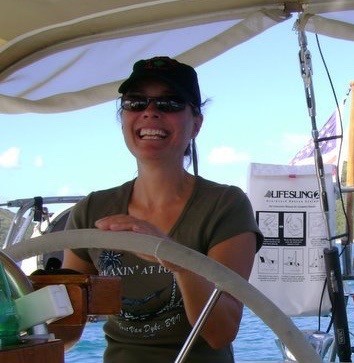
Who: Janet Maineri
Port: Coloma, CA
